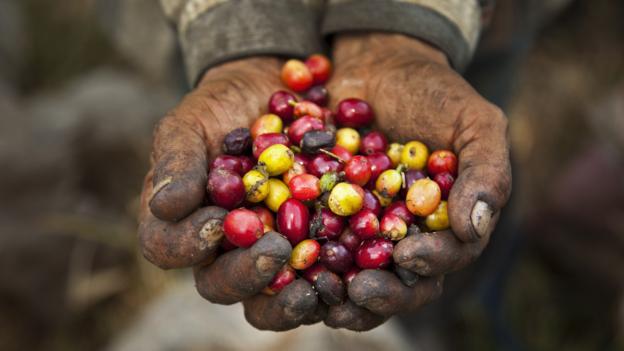
At first glance, the farm didn’t look any different than the one next door. A gravel road, flanked by short palm trees and overgrown brush, led to a modest home overlooking hundreds of coffee trees that sloped along the hilly landscape. Their leaves were decorated with a multitude of brightly hued beans, ranging from vibrant yellow to faded pink to plump, luscious red.
To the naked eye, this farm was just like any other. But it didn’t take long to realise that the farm of Jesus Martin was anything but ordinary.
Martin grew up like many others in the Santa Ana Valley – known as the Coffee Triangle of Colombia – on a coffee farm owned by his father and grandfather.
“I am the youngest of six children and we all worked the farm,” Martin said. “My parents focused their energies on teaching us the agricultural trade, but also the love behind it.”
Despite this dedication to coffee, he ended up pursuing a different trade all together: law and business management. However, coffee was never far away. During every visit to his family’s humble farm, the rich, toasted aromas of beans roasting and the smell of his mother’s carrot cake caused his heart to ache. Coffee was his life, and in 2004, after years practicing law, he found a way to blend his legal knowledge, business education and family’s lifeline into what he dubbed “the coffee dream project”.
Despite growing some of the most coveted beans in the world, most Colombians have never even tasted the Colombian coffee that is renowned around the world. Instead, locals drink what they call “second-hand coffee”, which is made from berries that haven’t fully ripened, have been over-roasted or even infected with insects and diseases. Like most businesses in struggling economies, the farmers only make profits on exports – so they save their best stuff for higher paying countries.
“Farming coffee for a profit is very challenging,” Martin explained, tossing a few berries in his hand. “The coffee trade intermediaries, exporters, roasters and big multinationals are the ones that benefit the most in the coffee-trade chain.”
Martin’s dream project, however, was to turn this process around, bringing specialty coffee back to Colombia. “When I first told my family, they told me I was crazy,” he said.
Even with his background in farming, starting the project from the ground up was difficult. Convincing his workers to focus on quality was his biggest obstacle; most only cared about quantity since their wage was dependent on how many beans they picked. Martin recalled many hours, days and weeks training local farmers to understand the process, from the colours of the raw berries to the smell and taste of the beans once they’d been dried and sorted.
Once the farmers understood the importance of quality, it was onto phase two: bring the roasting process in-house, instead of paying for the beans to be roasted elsewhere. Buying his own roaster – one of the only five in the entire country – was expensive, but the purchase offered a huge saving in roasting, packaging and exporting costs.
By 2008, his passion started to pay off; he opened his flagship store Café Jesus Martin in the charming town of Salento. The shop and its team of trained baristas, Martin said, has done much to teach the locals about enjoying specialty coffee. The look on their face when they take their first sip is what keeps him motivated.
“They are reacting so positively; they’re discovering something entirely different than what they’re used to consuming,” Martin said. “When they discover the difference in quality of their coffee, they start to care more about where and whom it’s coming from.”
Because of this interest, each bag of coffee sold in the vibrantly painted cafe has three distinct markings: the name of the coffee farm; the farmer who produced it; and the date it’s best enjoyed by. For Martin, this connects the locals to the farmers around them.
For many, a bustling cafe, a respected reputation and a profitable farm is success defined, but for Martin, it wasn’t until he watched his father sip a cup of his “crazy” idea, that it all sunk in.
“That moment that I saw my father enjoying a cup of coffee grown on his farm and roasted by his son, I realised my idea had been successful. That single cup of coffee came with my father’s history and a story of hard labour and dedicated perseverance. That was the day he told me that his coffee tasted like it always should have,” Martin said.
Today, you can find Martin in the fields of his Santa Ana farm, plucking ripe beans alongside his staff. Afterwards, he spends his afternoon rinsing and drying the beans, taking a quick break to consume a cup of his specialty blend or take a bite of his mother’s famous, homemade cakes. Then, he’ll stop into his Salento factory to help sort through the beans or make his way to the cafe to oversee the baristas and ensure that each cup is the best of the best.
It’s a busy life, but Martin’s story is far from over. He plans to open more cafes around Colombia and train as many farmers as he can to grow, roast and produce high-quality coffee. His days are long and exhausting, but he never stops working, dreaming or pursuing his passions. He’s changing the world of coffee for his family, friends, neighbours and fellow farmers – and that optimism is as contagious and addictive as the coffee he produces.
If you liked this story, sign up for the weekly bbc.com features newsletter, called “If You Only Read 6 Things This Week”. A handpicked selection of stories from BBC Future, Earth, Culture, Capital, Travel and Autos, delivered to your inbox every Friday.










